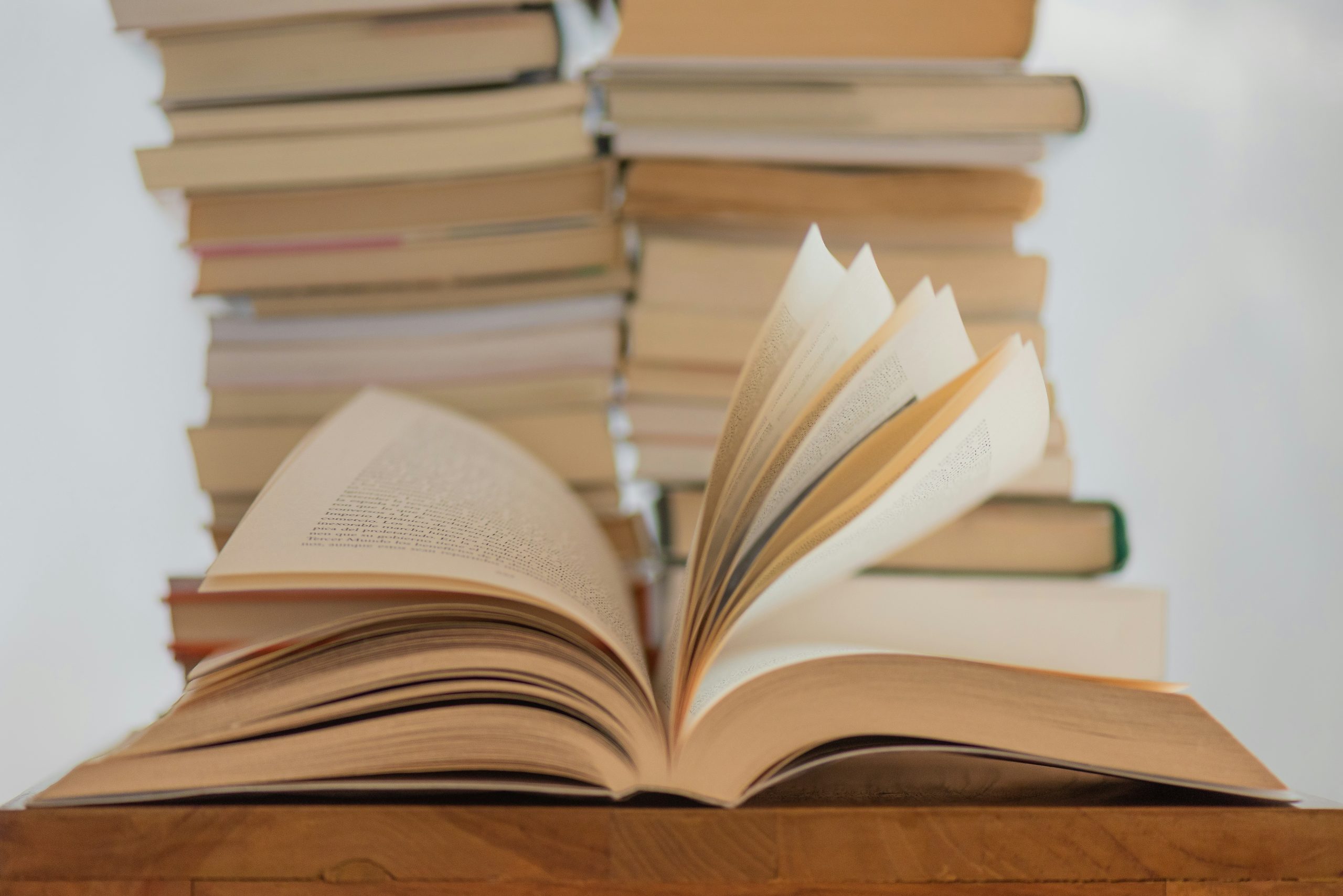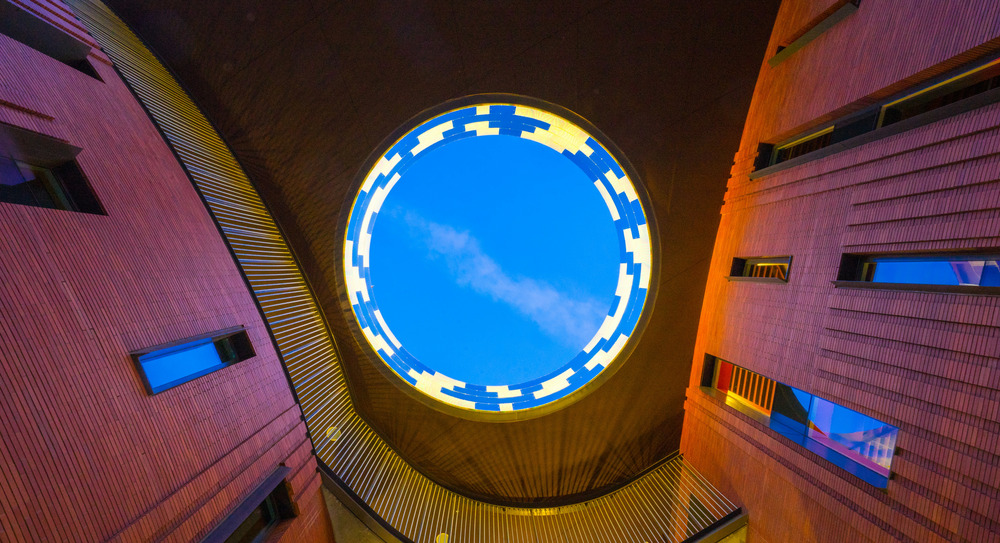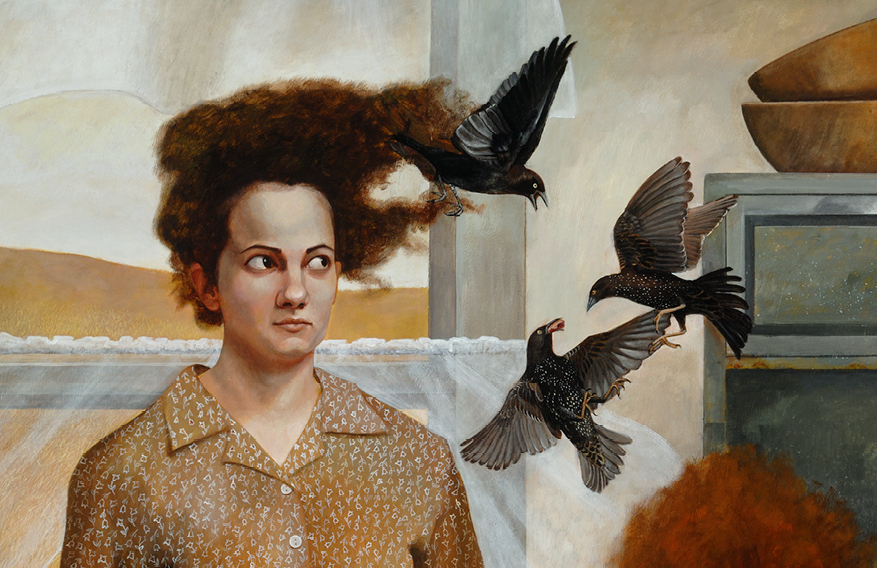news
Digging for Epiphanies: Newer Poets XVI

1. The still warm Marc Taper Auditorium buzzing after the reading. 2. Literary landmarks/Co-hosts Richard Modiano & Suzanne Lummis stealing a shot of the packed crowd for their website. My favorite part of the night was when Lummis then asked the people sitting on the far left to get up and fill in seats to the right.


The summer is here and I was sweating as I cruised through the tall, open doors of Los Angeles Central Library in falling orange light. It reminds me of Union Station- a window slicked tower cut in half by a half-mile of escalators. With its shadowy arches, long, echoing hallways, and a touch of that cool, Metropolitan grotesque, it might as well be called Gotham Library. The reading, Newer Poets XVI, is joint, annual effort of the LA Poetry Festival, the Beyond Baroque Literary Arts Center, and the Library Foundation of LA, and at the start, co-host Suzanne Lummis speculated, “I think there are many poets here tonight.”
As usual, I couldn’t wait to hear the punchlines. As soon any poem starts, its momentum is building towards those closing lines, that single abstract truth, like a burning fuse. It’s where the heart of the matter reveals itself to the reader and writer all the same, and hits you so hard you’ll never forget it.
Cassandra Love wrote of growing up torn between cultures, unable to speak the language of her mother, “Whispering a language I can’t speak but have always been able to feel.” She went on to describe giving birth to her daughter, Luna: “The mud made her stuck. Maybe I can push her to the other side of the Earth and into the dawn.” After she closed with her Valley Girl persona poem, channeling the girls she grew up with as she complains about getting her boobs like totally groped by her mom’s sleazy, drunk boyfriend, co-host Richard Modiano quoted Gregory Corso, saying, “If you want a good reading, always leave them laughing.”
1. First to read was poet & basketball player Cassandra Love who recently published her first book, Swagger is a Woman. “I’m really proud to be a part of this reading,” she said, “if only for this cool podium,” as she touched a hidden button and it rose towards her. 2. Anthony Seidman, author of On Carbon-Dating Hunger and Where Thirsts Intersect, uses magic realism on both micro and macro scales to access the existential vulnerability that connects all life in the universe.

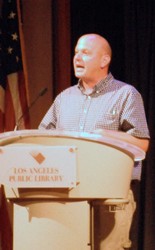
Anthony Seidman writes epics that feel at once large & small. He talked about “the red hurricane” that cleared a path for the 20th Century, one that raged “as the atom was split” and as “weather on Jupiter remained by our standards apocalyptic.” In hi poem titled “Transmission,” Seidman described, “A jungle no larger than a toddler’s tooth but teeming with beetles.” It’s a place where churning chaos & infinite stillness live without fear, howling just like Axl Rose.
Modiano said he stays on Facebook just so he can read A. Razor’s latest poems. He’s a true voice of the city, hard tones searching for soft beauty as tattoos creep up his arms. He says it all when he asserts that in LA, “Everything is named as if a holy detachment.” Since I work in film production, a few lines in his poem ‘Los Feliz’ hit home. “Lights! Camera! Action! The real love peels away like old lead paint.” He closed with a love poem: “I love you just because I want to, because I want you to want me, too, but this is the condition of wanting. It never feels like enough.”
1. I told lifelong local A. Razor after the reading that he makes me very happy because he actually looks like he’s from LA. Quoting his bio, “He has traveled extensively, seeking and enduring everything from homelessness and imprisonment to serenity and peace.” 2. Lory Bedikian, author of The Book of Lamenting, which received the Philip Levine prize and will publish in the Fall, closed her reading on her fascination with road trips. “Nothing that runs can stay the same.”


Introducing Lory Bedikian, Lummis celebrates the fact the the poets tonight are getting paid. Bedikian had my favorite line of the night: “There needs to be a saying: ask the bird in the back of our throat how we choke on what we hide.” Before reading a poem in which she called herself an Armenian crane that crossed over the Atlantic, she said, “In case you can’t tell by the title of the poems and bushy eyebrows, I’m Armenian. I tried to pluck them today but it doesn’t work. It’s like grass.”
Before welcoming Mehnaz Turner to read, Lummis called out to and welcomed a little girl in the crowd wearing a black bandanna and a pink t-shirt. “Don’t worry if you don’t understand every line,” she said, “we don’t either.” In “Apa’s Painting,” Turner writes about the corner of Lahore & Los Angeles, the two pinpoints of her heritage, and thinks back to a time before she “became this mess of torn up maps.” And in a poem she wrote about LA in Lummis’s noir class, she claimed, “This place feeds on a woman’s skin.”
1. Sherman Pearl is the president of the Beyond Baroque Literary Arts Center and one of the founders of the Los Angeles Poetry Festival. He admits he stretches the title ‘Newer poet’ description to its limit. “And so you see,” he said, “it’s never too late to be new.” 2. Poet Mehnaz Turner is an English teacher by day, leading her to confess that she organized her set list by themes & motifs. Later, she confessed in a poem, “Sometimes at lunch I draw people’s auras without the fear of being called an eccentric school girl.”
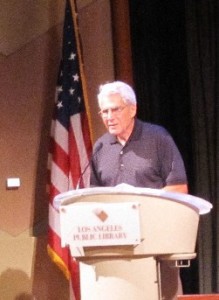
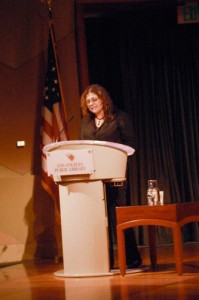
Sherman Pearl is the veteran of the lineup, an essential piece of the LA poetry world since 1979. He’s an entertainer and a philosopher, reminding me of my time watching John Fitzgerald at the Festival of Books. In a piece called ‘Junk Sculptures,’ he claimed “I myself am shaped by torn up photographs…Synagogue relics…everything I save from the trashcan is welded to me. Bit by bit I grow.” Next came a piece about how his Socialist, union organizer father hated the game Monopoly more than anything. Sherman “plott[ed] his brother’s bankruptcy” regardless of his father’s lectures on greed, and after winning, his father “picked up the underdog and held him to his heart.” The last poem of the night, titled ‘What I Came For,’ found beauty in a senior moment: “I looked for it in the fridge…I emptied teacups for clues…thought maybe what I came looking for was in the bedroom…we’ll laugh about things we lost in the air…”
A theme common among all the poets, indicative of this bottlenecked & bubbling melting pot, are the personal struggles in defining one’s mixed identity, especially when considering place. Maybe it’s because this town wants something a little different every day.
–David Ohlsen, an LA native, is a thoughtless product of UC Riverside’s Creative Writing program and is a regular contributor to Electric Dish.






